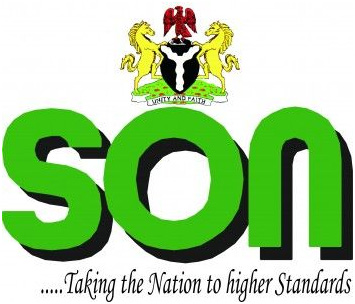The Standards Organisation of Nigeria (SON) has said lack of presence of its personnel at the nation’s seaports to check containers bringing goods into Nigeria accounts for a 200 per cent rise in the volume of substandard goods in the country in the last four years. The agency is consequently seeking to return to the ports.
The Director, Inspectorate and Compliance Directorate, SON, Bede Obayi said since the agents of the organisation were withdrawn from the seaports, the agency had not been able to effectively monitor and control the influx of substandard goods into the country.
The Federal Government, through the Federal Ministry of Finance, had in October 2011 ordered SON and eight other agencies and various units operating at the nation’s seaports to vacate the place.
According to the then Minister of Finance, Dr. Ngozi Okonjo-Iweala, the exercise was aimed at reducing the number of agencies at the ports and facilitating clearance of cargo as well as maximisation of Federal Government’s revenue.
Prior to the time the order to vacate the ports, agencies at the seaports were the State Security Service (SSS), SON, National Agency for Food and Drug Administration and Control (NAFDAC), Directorate of Naval Intelligence (DNI), National Drug Law Enforcement Agency (NDLEA), Federal Environmental Protection Agency (FEPA), the Port Police alongside its Bomb Disposal Unit; Plant Quarantine with Veterinary Quarantine; Nigerian Immigration Service, Port Health; Nigeria Customs Service (NCS), Nigerian Ports Authority (NPA), Nigeria Immigration Service (NIS) and the Nigerian Maritime Administration and Safety Agency (NIMASA).
All the agencies were subsequently mandated to leave the ports except NPA, Customs, Ports Health, NIS, Port Police, SSS, NIMASA and the NDLEA.
Obayi said the situation had hindered the work of SON and posed a lot of danger to the economy since almost 80 per cent of goods coming into the country were coming through the seaports. “It is very bad for us to allow these goods to be coming in without SON being physically present to check them because importers may present fake certificates to other agencies that do not have the facilities to cross- check like SON would do,” he said.
According to him, in order to control the influx of substandard goods into the country, the agency had to undertake warehouse monitoring and interception of containers on the highways.
He said: “What we do in warehouse monitoring is intercept the goods as they are being brought into the warehouses.
“But since warehouses are not identified like offices, one person who lives in Ikoyi can own seven warehouses in Kirikiri and will not even disclose this fact to the agency.
“So all this lack of transparency on the part of importers makes our work challenging.
“We also intercept containers along the highways but it is not all containers that the agency is able to intercept.
“Out of 10 containers in a consignment, the agency may be fortunate to intercept only one.
“At that point, 90 per cent of the substandard products had already entered the Nigerian market.”
Obayi said because of corruption, whereas the Federal Government had said SON should be contacted when there were issues of standardisation at the ports, the agency had not been receiving such summons.
“We don’t receive invitation from the ports and we cannot keep waiting for such invitations while containers are flying in everyday with substandard products. Most of the containers come in at night, by 2am because they lack the necessary documentations. When we intercept them, the owners will claim they forgot or that they were told by their agents that SON documentation was no longer needed,” he said.
Obayi said through its warehouse monitoring, tagged “Operation flush out substandard products,” the agency had discovered and destroyed billions of naira worth of substandard goods in the last three months.
He said in June, the agency intercepted 10 container load of fake baby diapers valued at N200million at the railway terminus, Ijora Olopa, Lagos.
SON had said that the stuffing of the diapers was done in an unhygienic environment and was capable of infecting children with skin rashes and diseases.
Also in the same month, the agency sealed off a warehouse with N2billion worth of fake automobile spare parts. Inside the warehouse were expired tyres and tubes that were as old as seven years.
Obayi said the agency would continue to do its best in intercepting these products before they got into the markets.
By Pita Ochai
[divider]


